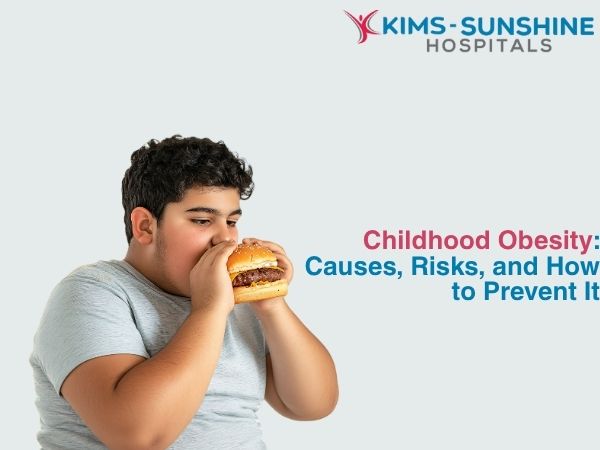
Childhood Obesity: Causes, Risks, and How to Prevent It
 Childhood obesity affects millions of children worldwide- starting from the age of 2. Medically speaking, it has been defined as a child being in the 95th percentile or above, at a particular age, with respect to body weight. In India especially, this is a matter of grave concern- as a study in 2022 stated that over 12.5 million children within the ages of 5-19 were obese. The percentage of overweight children has also gone up drastically in children below 5 years of age, from 2.1 to 3.4% between the years- 2015-2021. This has now become a public health issue due to lack of awareness that being overweight in childhood can mean dealing with plenty of health problems later on. Sure, chubby kids look cute, but cuteness shouldn’t be a quality that we parents have to aspire for- not if it puts their health at risk in their future.
Childhood obesity affects millions of children worldwide- starting from the age of 2. Medically speaking, it has been defined as a child being in the 95th percentile or above, at a particular age, with respect to body weight. In India especially, this is a matter of grave concern- as a study in 2022 stated that over 12.5 million children within the ages of 5-19 were obese. The percentage of overweight children has also gone up drastically in children below 5 years of age, from 2.1 to 3.4% between the years- 2015-2021. This has now become a public health issue due to lack of awareness that being overweight in childhood can mean dealing with plenty of health problems later on. Sure, chubby kids look cute, but cuteness shouldn’t be a quality that we parents have to aspire for- not if it puts their health at risk in their future.
What Causes Childhood Obesity And How To Prevent It?
Childhood obesity literally means that a child is overweight or obese and is hence not at a healthy weight range. The BMI values for children differ from adults, as they grow a lot, which is why age and gender specific charts are used to plot growth accurately. Obesity is a chronic condition in childhood and adulthood. It is normally caused by a host of factors like overeating, not getting enough exercise, not being able to find time to play or for sports- as the pressure to study and get good marks can be overwhelming in most cases. Some of us pass on faulty genes to our children, which is why there is a genetic component to it. Obesity is never caused due to plain laziness or lack of willpower. When a mother gains too much weight during pregnancy, she puts her children at risk of being overweight later on. The same principle applies to diabetes. For children especially, the environment in which they grow up is super crucial- if there is too much stress, it can affect them badly. Forcing kids to finish everything on their plate, not letting them decide how much they want to eat and not preparing home made meals are major causes for childhood obesity, along with increased screen time these days. But, some children may be obese because of certain other medical conditions like hypothalamic tumours, hypothyroidism, Cushing syndrome or other hormonal deficiencies.
Effects Of Childhood Obesity On Long-Term Health
Children who are obese in childhood are at a much higher risk of developing chronic issues like hypertension, diabetes mellitus, insulin resistance, prediabetes, fatty liver disease, asthma, sleep apnoea, PCOS, heart disease or even depression in some cases. Obese and overweight children are also bullied a lot, which means their mental health is at stake too.
How Screen Time Contributes To Childhood Obesity?
A screen and a meal do NOT go well together, because you get too invested in the show and don’t care about what or how much you eat. This means there is a high possibility that you will end up overeating. Binge watching a new series may seem super tempting but it can mess with the sleep cycle and cause you to give in to snacking too. The same thing can happen to children, which is why we beg you not to watch TV or use a screen when eating. Children also tend to watch a lot of ads which are designed to increase cravings.
Conclusion
A healthy diet plan for children to prevent obesity does not involve anything fancy. You just need to make sure they eat well- by including plenty of fresh fruits and vegetables, offering different carbohydrate sources, offering them healthy snack options and getting them to drink plenty of water. Healthy fats are a necessity too, but it should never come from processed or overly fried foods. We know expecting children to eat clean everyday can be challenging, but if you make some changes slowly, it can be very rewarding in the long run. You can also go for a walk, run or a swim with them and ask if they’d rather go for taekwondo or a dance class. Just keep them moving and they should be fine.






